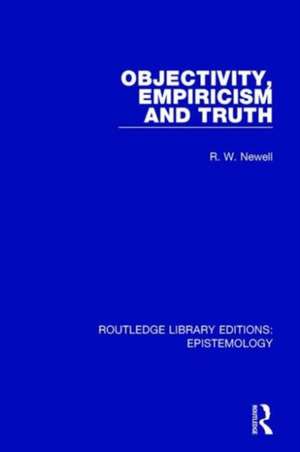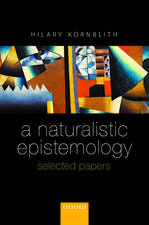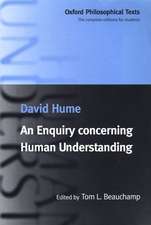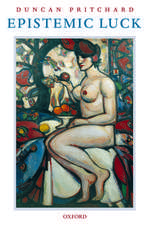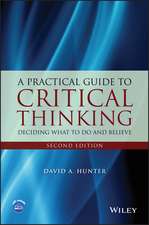Objectivity, Empiricism and Truth: Routledge Library Editions: Epistemology
Autor R. W. Newellen Limba Engleză Paperback – 10 mai 2016
| Toate formatele și edițiile | Preț | Express |
|---|---|---|
| Paperback (1) | 324.33 lei 6-8 săpt. | |
| Taylor & Francis – 10 mai 2016 | 324.33 lei 6-8 săpt. | |
| Hardback (1) | 676.59 lei 6-8 săpt. | |
| Taylor & Francis – 21 mai 2015 | 676.59 lei 6-8 săpt. |
Din seria Routledge Library Editions: Epistemology
- 33%
 Preț: 5569.87 lei
Preț: 5569.87 lei - 13%
 Preț: 297.18 lei
Preț: 297.18 lei - 12%
 Preț: 300.02 lei
Preț: 300.02 lei -
 Preț: 400.33 lei
Preț: 400.33 lei - 13%
 Preț: 296.69 lei
Preț: 296.69 lei -
 Preț: 404.08 lei
Preț: 404.08 lei - 43%
 Preț: 190.27 lei
Preț: 190.27 lei - 13%
 Preț: 298.59 lei
Preț: 298.59 lei - 13%
 Preț: 295.75 lei
Preț: 295.75 lei - 13%
 Preț: 297.18 lei
Preț: 297.18 lei - 12%
 Preț: 304.27 lei
Preț: 304.27 lei - 13%
 Preț: 297.18 lei
Preț: 297.18 lei - 18%
 Preț: 124.93 lei
Preț: 124.93 lei - 13%
 Preț: 320.09 lei
Preț: 320.09 lei - 13%
 Preț: 294.83 lei
Preț: 294.83 lei
Preț: 324.33 lei
Preț vechi: 371.71 lei
-13% Nou
Puncte Express: 486
Preț estimativ în valută:
62.08€ • 65.17$ • 51.28£
62.08€ • 65.17$ • 51.28£
Carte tipărită la comandă
Livrare economică 30 ianuarie-13 februarie 25
Preluare comenzi: 021 569.72.76
Specificații
ISBN-13: 9781138908659
ISBN-10: 1138908657
Pagini: 136
Dimensiuni: 156 x 234 x 15 mm
Greutate: 0.45 kg
Ediția:1
Editura: Taylor & Francis
Colecția Routledge
Seria Routledge Library Editions: Epistemology
Locul publicării:Oxford, United Kingdom
ISBN-10: 1138908657
Pagini: 136
Dimensiuni: 156 x 234 x 15 mm
Greutate: 0.45 kg
Ediția:1
Editura: Taylor & Francis
Colecția Routledge
Seria Routledge Library Editions: Epistemology
Locul publicării:Oxford, United Kingdom
Public țintă
Postgraduate and UndergraduateCuprins
Introduction 1. The Human Contribution: William James and Thomas Kuhn 2. The Two Faces of Objectivity 3. A Role for Observation 4. Certainty and Human Action: Wittgenstein 5. Reason and Particular Cases: John Wisdom 6. Rationality, Relativism and Objectiveness
Descriere
Originally published in 1986. The clash between orthodox empiricism and a pragmatism inspired by Wittgenstein, William James, Thomas Kuhn and John Wisdom forms the background to the argument in this book. It shows how the theory of knowledge can be shaped around our actions without sacrificing reason’s control over our beliefs.
